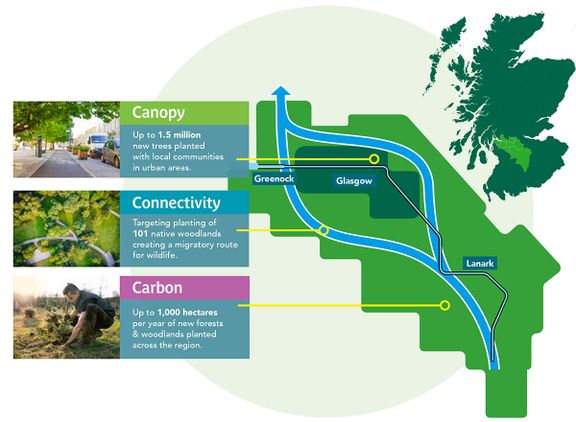The Clyde Climate Forest will see 18 million trees planted in both urban and rural parts of Glasgow City Region over the next decade.
Trees, woodlands and forests are recognised as essential if we are to address the Climate Crisis by reducing damaging atmospheric emissions and are crucial to assist in a recovery for nature.
The Clyde Climate Forest builds on the current enthusiasm for tree planting and will channel that interest into worthwhile and well-considered tree planting projects that deliver a broad range of climate and ecological benefits to Glasgow City Region.
The project was born out of the Green Network Blueprint and is part of the Strategic Habitat Network, to learn more see our animation.
The Clyde Climate Forest By 2030

Canopy
Increase the average tree canopy cover in urban Glasgow to 20%

Connectivity
Increase the average broadleaved woodland network area by 20%

Carbon
Increase forest and woodland cover in Glasgow city region to 20%
Why Plant Trees?
NATIVE WOODLANDS provide essential ecosystem services and wildlife habitat. Creating connected woodland networks will help to reverse the habitat fragmentation caused by decades of urban development, protect biodiversity, and offer migratory routes north as the climate changes.

PLANTATION FORESTS are effective carbon sinks and can provide: natural flood management; construction timber to substitute for high emission steel and concrete; and wildlife habitats. Potentially over 9,000 hectares in the region could become new forests including on vacant land.
The current extent of land covered in forests or woodland in Glasgow City Region is 17%

URBAN TREES provide cooling in heatwaves and surface water management for cloud-bursts, whilst also providing some carbon storage and wildlife habitat. Even a moderate increase in canopy cover can aid adaptation to the adverse effects of climate change.

Where will we plant trees?

Planting targets
The Clyde Climate Forest spans Glasgow City Region and has been endorsed by the Council Leaders of East Dunbartonshire, East Renfrewshire, Inverclyde, Glasgow, North Lanarkshire, Renfrewshire, South Lanarkshire, and West Dunbartonshire. We are identifying tree planting targets in three areas: canopy, connectivity and carbon.
New urban tree planting will occur in neighbourhoods with low levels of canopy cover, particularly in areas of deprivation and at risk from the impacts of climate change. With up to 1.5 million new trees planted with local communities in urban areas.

New native woodlands will be planted in places which connect existing woodland networks and provide a northerly migration route for woodland wildlife as the climate changes. 101 native woodlands will be planted in identified locations across a migratory route for wildlife.

New forest and woodland plantings will happen where they will deliver: good rates of carbon sequestration; help reduce downstream flooding; and provide for nature. 1,000 hectares per year of new forest & woodlands will be planted across the region.

Clyde Climate Forest Brochure
We’ve produced a brochure to explain more about the Clyde Climate Forest project. You can view it below or download via the button.
How can I get involved?
You can help the Clyde Climate Forest grow in a number of ways. Communities and individuals can help to plant trees, look after local trees or help raise funds. Businesses can support community tree planting events through staff participation and/or sponsorship, and landowners can consider the opportunities for planting trees on their land.
Donate to the Clyde Climate Forest at: MyParkScotland

Communities can get involved by helping us identify opportunities for tree planting by finding sites where trees can be planted. We’re keen to involve local people in planting trees in neighbourhoods with low levels of tree cover, especially young people as they will gain most from seeing these trees grow and thrive in years to come.
You can also help us to protect and nurture trees in your local neighbourhood as we want the trees planted as part of the Clyde Climate Forest to reach their potential and provide the many benefits to people and wildlife which only mature trees can deliver.
For more information contact: community@clydeclimateforest.co.uk

Business:
Businesses can help as part of Corporate Social Responsibility commitments through sponsorship providing the opportunity to help build climate resilience in local communities. Organisations based in Glasgow City Region may also wish to encourage staff to participate in a corporate tree planting activity.
Businesses can also purchase local carbon credits to help offset residual emissions not met through their corporate climate change strategy helping toward NetZero goals.
For more information contact: business@clydeclimateforest.co.uk

The Clyde Climate Forest can’t succeed without land upon which to plant trees, woods and forests. We need landowners and land managers to consider the opportunities for tree planting as part of the Clyde Climate Forest. There are multiple benefits for landowners including; growing timber and carbon credits for use or sale, as shelter for crops or livestock and provision of valuable wildlife habitat.
Free Farm Woodland Assessments and grants may also be available. Contact us on: land@clydeclimateforest.co.uk for more.


Case Study: Community Planting
Faifley Knowes Park, Clydebank
600 trees planted by TCV through corporate sponsorship
Multiple benefits for local wildlife and people
Important link in the Strategic Access Network

Case Study: Tiny Forest
Seven Lochs Tiny Forest
A dense mix of 600 native trees planted as the first of many ‘tiny forests’
Part of Scotland’s largest urban nature park

Case Study: Private Sector
McLaughlin & Harvey Construction Limited
McLaughlin & Harvey signed off their new Carbon Strategy with a commitment to Net Zero by 2030
To achieve their net zero plans, M&H will be investing in the Clyde Climate Forest

Case Study: Farming Sector
Hillhead Farm, Torrance
Planting trees across 27ha with FGS support on unproductive land
Diversification to secure the family business for generations
Reducing carbon footprint and supporting ecosystems

Case Study: Utility Sector
Scottish Water
Plans to support biodiversity and net zero emissions through woodland expansion
Has identified sites to support development of the Clyde Climate Forest and will assess all landholdings for the potential to improve sequestration

Case Study: Public Sector
Cart & Kittoch
40 000 trees being planted creating a new woodland the size of 45 football pitches, helping Glasgow City Council toward Net Zero in association with Green Action Trust
A woodland habitat network linking Coulter’s Wood, Cathkin Braes and Cart & Kittoch woodland (a Site of Special Scientific Interest)
View our other delivery projects

Newsletter Signup
Learn more about GCV Green Network! You can be the first the hear about our latest news.
Designed & Built by Mucky Puddle










